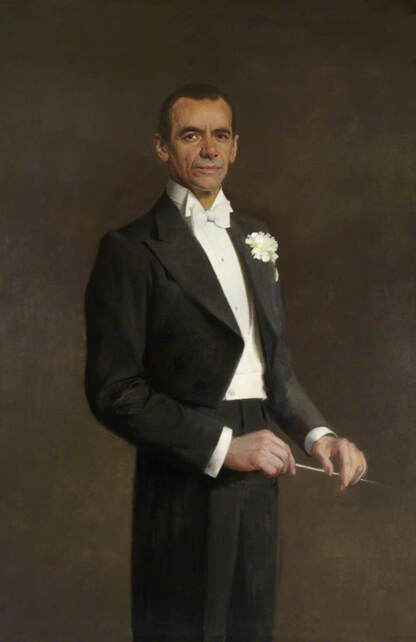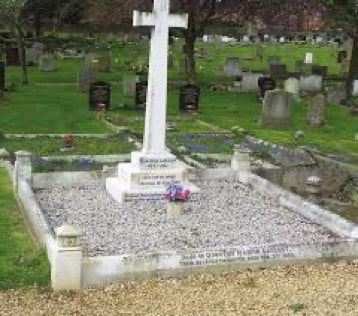Sir Harold Malcolm Watts Sargent (1985-1967)
|
Malcolm Sargent was the eldest son of Agnes and Henry Sargent . Born in Kent on April 29th 1895, while his parents were visiting friends in Ashford, he grew up in Stamford and always regarded it as his home town. His mother had been a matron at Stamford High School before her marriage to Henry, who worked as a coal merchant in the town. They lived at 24 Wharf Road, Stamford, which is where his Blue Plaque is mounted.
Henry was a keen amateur musician and arranged for his son Malcolm to have piano lessons from an early age. Sargent attended the National School and Blue Coat School in Stamford before winning a scholarship at 12 to Stamford Grammar School (now Stamford School). Clearly showing huge musical promise, Sargent also showed talent as an organist in his early teens, playing at churches in Stamford. His first taste of conducting was as a teenager of 14 with the Stamford Operatic Society's production of The Yeoman of the Guard when he stood in for the regular conductor, and aged 17 in 1912, made his first public appearance at a major local event as conductor at a pageant to commemorate Queen Elizabeth I's visit to Burghley House. Two years later, in 1914, having been articled to the organist at Peterborough Cathedral, Sargent was awarded a Bachelor of Music degree by Durham University and appointed organist at St Mary's Parish Church in Melton Mowbray. The following year he took up a position as music master at Melton Mowbray Grammar School before serving with the 27th Durham Light Infantry during World War One. After his discharge he was awarded a Doctorate in Music by Durham University. At 24, he was the youngest person ever to have achieved that distinction. |
In 1921 he was introduced to Sir Henry Wood after composing and conducting a piece in front of him at Leicester. Wood was so impressed with the young Sargent that the latter was invited to conduct the same piece at the Proms in London later that year. Thus began a long association with the Proms concerts, culminating in Sargent being its Chief Conductor between 1946 and 1967. Married in 1923, Sargent had two children, one of whom predeceased him. The same year he became a lecturer at the Royal College of Music.
Although chiefly known as a conductor, his compositions were also well regarded and his outstanding talent as a pianist suggested that he could have succeeded as a professional concert pianist. However, he chose to focus on conducting. His workload was prodigious and his energy tireless. He juggled a seemingly impossible diary, conducting major choral, orchestral and operatic works , together with making recordings for every major record label and over 4,000 recordings for the BBC . During the 1920s he became known as one of Britain's best known conductors and in particular, is still, in the view of many experts, Britain's best-ever conductor of choral music.
He became Chief Conductor of the Royal Choral Society in 1928, a position he held for the rest of his life. With Sir Thomas Beecham he founded the London Philharmonic Orchestra in 1932 and was later Chief Conductor of the Halle Orchestra , the Liverpool Philharmonic and the BBC Symphony Orchestra, in addition to leading and working with numerous other orchestras, world class and less well known . Although he tackled a wide repertoire of music, he championed the work of British composers and pursued his commitment to bring classical music to the widest possible audience.
His nickname was 'Flash Harry', it is thought on account of his impeccable sense of style and dress.
He was knighted in 1947. He travelled extensively, particularly in the Commonwealth, and became known as an unofficial music ambassador to Britain.
Although chiefly known as a conductor, his compositions were also well regarded and his outstanding talent as a pianist suggested that he could have succeeded as a professional concert pianist. However, he chose to focus on conducting. His workload was prodigious and his energy tireless. He juggled a seemingly impossible diary, conducting major choral, orchestral and operatic works , together with making recordings for every major record label and over 4,000 recordings for the BBC . During the 1920s he became known as one of Britain's best known conductors and in particular, is still, in the view of many experts, Britain's best-ever conductor of choral music.
He became Chief Conductor of the Royal Choral Society in 1928, a position he held for the rest of his life. With Sir Thomas Beecham he founded the London Philharmonic Orchestra in 1932 and was later Chief Conductor of the Halle Orchestra , the Liverpool Philharmonic and the BBC Symphony Orchestra, in addition to leading and working with numerous other orchestras, world class and less well known . Although he tackled a wide repertoire of music, he championed the work of British composers and pursued his commitment to bring classical music to the widest possible audience.
His nickname was 'Flash Harry', it is thought on account of his impeccable sense of style and dress.
He was knighted in 1947. He travelled extensively, particularly in the Commonwealth, and became known as an unofficial music ambassador to Britain.
|
He died aged 72 in 1967 following surgery for pancreatic cancer, leaving an endowment for the Malcolm Sargent Cancer Fund (now CLIC Sargent). Malcolm Sargent Primary School in Stamford is named after him. He is buried with members of his family in Stamford Cemetery.
There are two other Blue Plaques marking Sir Malcolm Sargent's homes, one in Melton Mowbray, where he lived between 1914 and 1924 and another on Albert Hall Mansions, opposite the Royal Albert Hall in Kensington, where he was living when he died. |
Text provided by Yvonne Pini






